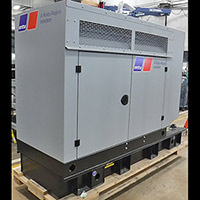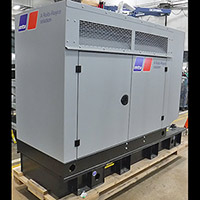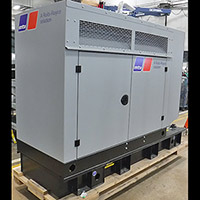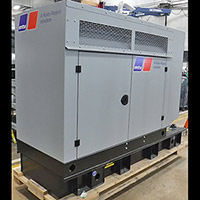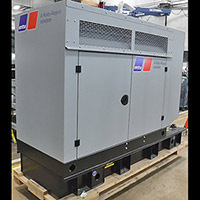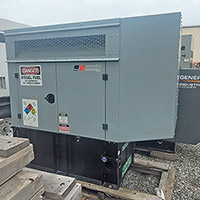New and used industrial diesel generators for standby emergency power in commercial and industrial power systems. Global Power Supply has top-rated new, surplus, and used industrial generators from trusted brands like MTU Onsite Energy, Cummins, Kohler, CAT, Hipower, and more.
For more information on diesel generators
Understanding Industrial Diesel Generators Inside & Out
Among the many types of generators available for industrial applications, diesel generators are a great option. They’re efficient, durable, and reliable enough to cover the backup power requirements of most critical facilities.
Without the right knowledge, finding the right diesel generator to supplement or replace your backup power system can be tricky. To make your search simpler and easier, we at Global Power Supply share everything to know about diesel generators, including:
- What Diesel Generators Are
- The Benefits of Using Diesel Generators
- The Differences Between Natural Gas & Diesel Generators
- How a Diesel Generator Works
- Types of Diesel Generators to Choose From
- Why Diesel Generators Are Necessary For Various Industries
- Factors to Choose the Right Diesel Generator
What is a Diesel Generator?
A diesel generator combines a diesel engine and an electrical alternator. Together, they produce electrical energy through the combustion of diesel fuel. The generator’s versatility also allows it to produce energy using other fuels, including natural gas.
Diesel generators are mainly used for backup and standby power in a wide range of critical industries, from manufacturing to healthcare. They also have power systems that do not connect to the power grid, which is perfect for remote work sites.
Benefits of Using Diesel Generators
Getting a diesel generator offers immense benefits for your facility’s power infrastructure. Below are some of the most prominent advantages of diesel generators:
High Durability
Diesel generators are known for being rugged. They provide a reliable power source and are built to withstand various environments and conditions.
This is because they are built using heavy-duty parts created to handle high temperatures and pressures. From their internal components to their external enclosures, diesel generators are built to last.
Less Maintenance
Because of their excellent durability and sturdy construction, industrial diesel generators can last for years with far less maintenance than other generator types.
Of course, that doesn’t mean you should ignore them, especially if your diesel generator is used as a backup for critical operations.
Rest assured, with proper check-ups and regular maintenance service, diesel generators will produce plenty of energy with few issues for many years.
Fuel Efficient
One of the biggest benefits of using diesel generators is their power efficiency. Diesel generators have an efficiency ratio of around 25% since they use around 0.4 liters of fuel for every kWh produced.
However, diesel fuel tends to be more expensive than gasoline. But, when used with a well-configured automatic transfer switch, a diesel generator can be an excellent standby or backup power source.
Safer Storage
In addition to its long shelf life, diesel fuel is much safer to store and use. It requires a great deal of pressure and heat to burn, making it much safer than other fuel sources. By using a safer fuel source, diesel generators are more dependable, too.
The Differences Between Natural Gas & Diesel Generators
Natural gas generators are also commonly used in the critical power infrastructure of many facilities. However, they face tough competition from diesel industrial generators.
To get a better idea of how beneficial diesel generators are, here’s a quick comparison of their differences with natural gas generators:
- Noise — Natural gas generators can sometimes be quieter while running than diesel generators. Despite that, diesel generators have improved over time to become much less noisy compared to older models.
- Service Lifetime — Diesel generators are built with heavier-duty components than natural gas generators. Diesel fuel also tends to affect internal components more than natural gas, causing less wear and tear over time.
- Fuel Efficiency — Diesel generators, especially BI-Fuel-Diesel units, can be modified to operate using up to 80% natural gas and 20% diesel. These generators require less gas to produce power than natural gas generators. This means they have higher fuel efficiency and can run longer without refueling.
- Installation — Because of their tougher components, industrial diesel generators tend to be heavier and thus more difficult to install than natural gas generators. This is arguable, however, since natural gas generators often need a pipeline installation connection to receive a proper supply of fuel.
- Cost —The best choice depends on size and power requirements. Depending on the size, diesel generators generally cost less than natural gas. Plus, they offer lower maintenance and fuel costs after installation.
When comparing the differences between the two types of generators, diesel generators may be the better option for facilities that need a reliable power source. However, natural gas generators can also be ideal for other situations.
Talk to an expert from Global Power Supply. We’ll lay out your specifications and needs to help you find the right option for your facility. Shop our broad selection of used, new, and surplus industrial power systems today!
Types of Diesel Generators
Diesel generators come in a wide variety of types and configurations, each suited to a different need and application. Below, we list and describe each kind available according to their features, cooling function, and combustion cycle:
By Features
Several types of diesel generators differ in design, which ensures that they provide power under specific conditions.
Mobile/Trailer-Mounted
Mobile diesel generators are designed to be lightweight and compact for easy access and transport. They are often used as temporary power sources for applications like road, housing, or facility construction. Depending on the amount of energy required, they can be relatively small or trailer-mounted to fulfill more extensive power supply needs.
Standby
Also known as backup power sources, these diesel generators maintain service to critical operations equipment. They’re commonly installed as part of an emergency power supply system in facilities such as hospitals, data centers, and industrial plants.
Prime
These diesel generators are meant to be used as the primary source of power for a work site or facility. They’re designed to operate for hundreds and even thousands of hours, all to ensure your facility doesn’t require a direct utility power line until you decide to get one. These are among the most durable and highest-capacity diesel generators available, capable of supporting heavy industrial electrical loads.
Liquid-Cooling Function
Larger, high-power capacity diesel generators use a liquid cooling system. These gen-sets use a water-based coolant mixture that circulates through a radiator system to reduce heat within a diesel engine. Although these types of generators need much more maintenance than air-cooled ones, they are able to cover the highest level of power capacity needed for your facility’s needs.
Four-Stroke Combustion Cycle
Diesel generators that use a four-stroke engine are much more powerful and complicated in design. Like a two-stroke, a four-stroke generator has four phases in its combustion cycle: intake, compression, power, and exhaust.
These phases all work harmoniously to ensure the diesel generator produces a clean and efficient amount of energy. Four-stroke diesel generators are also often used for commercial and industrial applications, particularly where reliability and fuel efficiency are emphasized.
The Necessity of Industrial Diesel Generators
Diesel generators are used in many industries. In many cases, they are a necessity to ensure critical operations can continue despite power outages. Check out the many industrial applications that diesel generators are used for:
- Construction — Worksites often require access to a reliable, off-grid power supply that is safe and efficient to use. When it comes to keeping a construction site running, there are few better options than a mobile or trailer-mounted diesel generator. One or more of these on a building site can ensure your work crew can use the power tools necessary to ensure an efficient and lasting construction.
- Airports — Many airports rely on diesel generators to ensure safety and reduce flight delays. Whether to power vital equipment and systems or to provide standby power in case of emergencies, diesel generators are an essential part of every airport’s critical power infrastructure.
- Medical Facilities — Clinics, surgical centers, and hospitals need round-the-clock power availability, as it is a matter of life and death for many patients. Diesel generators can ensure medical facilities have all the uninterrupted energy resources they need as part of a standby and backup power system.
- Telecommunications — Networks across the country have grown and become extremely important in maintaining critical operations for businesses and other important institutions. To ensure minimal downtime, telecom facilities can use industrial diesel generators to provide emergency power whenever the utility grid is affected.
- Data Centers — Thanks to data centers, millions can use countless services and applications hosted online. In order to maintain long-term data integrity and availability, these structures require a consistent power source. As part of an uninterruptible critical power infrastructure, an industrial diesel generator can act as a redundancy, ensuring your data center never experiences data loss or downtime due to power outages.
- Renewable Energy — While diesel itself isn’t considered renewable, it has the potential to help support the renewable energy market. As part of a hybrid mini-grid, diesel generators can compensate when a renewable source such as solar panels or wind turbines is unable to produce more energy. Though there are some potential issues with this type of system’s feedback mechanism, there is also great potential as diesel generators continue to advance.
- Microgrids — Diesel generators also have the potential to become a supportive power source within a well-managed microgrid. With the right systems in place, such as reliable battery storage and a configured automatic transfer switch, diesel generators can help you construct an excellent microgrid for your facility.
Diesel generators are an excellent part of any critical power infrastructure. They’re fuel-efficient, durable, and safe to use for nearly any purpose, making them suitable for vital facilities in nearly any industry.
Find Top-Rated Critical Energy Systems at Global Power Supply
Global Power Supply is a full-service provider of power systems. In addition to an immense stock of natural gas and diesel generators, uninterruptible power supply systems, battery storage units, and much more, our team also offers custom engineering solutions.
Our end-to-end services will ensure your power supply is prepped and ready for any emergency, giving you seamless and continuous energy no matter what. Contact Global Power Supply and find out how we can meet your critical power needs.
Frequently Asked Questions
What are the primary considerations when integrating a diesel generator into an existing power infrastructure?
Key considerations include load profile analysis, fuel storage logistics, emission compliance, and synchronization with existing power management systems. Proper sizing and integration are critical to ensuring reliable backup power and seamless operation during grid failure.
How does a diesel generator’s load factor impact its long-term performance?
Operating a diesel generator at an optimal load factor, typically between 70-80%, maximizes fuel efficiency and extends the engine’s lifespan. Underloading can lead to wet stacking, while overloading can cause overheating and premature wear.
What are the advantages of using a diesel generator in high-demand industrial settings?
Diesel generators are preferred in high-demand settings due to their robustness, fuel efficiency, and ability to handle large loads for extended periods. Their resilience under heavy use makes them ideal for critical infrastructure where uptime is paramount.
How should diesel generators be maintained to ensure compliance with industry standards?
Regular maintenance should include oil and filter changes, fuel system inspections, and load bank testing. Adherence to manufacturer guidelines and industry standards, such as NFPA 110, is essential for ensuring reliability and compliance.
What factors influence the total cost of ownership (TCO) for diesel generators?
TCO is influenced by initial purchase costs, fuel efficiency, maintenance frequency, and the operational environment. Properly managed, diesel generators offer a favorable TCO due to their durability and long service life.
What are the emission control technologies available for diesel generators?
Technologies such as Selective Catalytic Reduction (SCR) and Diesel Particulate Filters (DPF) are used to reduce NOx and particulate emissions, respectively. Compliance with Tier 4 Final emissions standards is increasingly critical in regulated environments.
How can diesel generators be optimized for parallel operation in complex power systems?
Synchronization and load sharing are critical when operating multiple diesel generators in parallel. Advanced control systems are necessary to manage load distribution, prevent power imbalances, and ensure smooth transitions between power sources.
